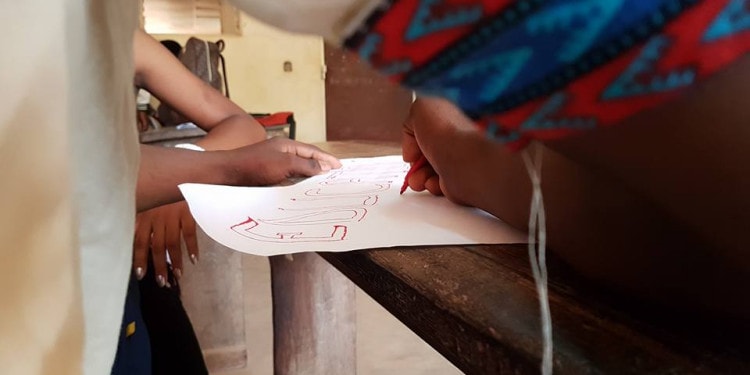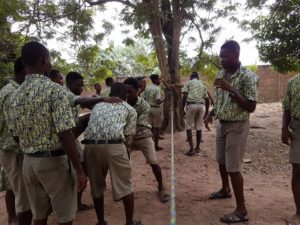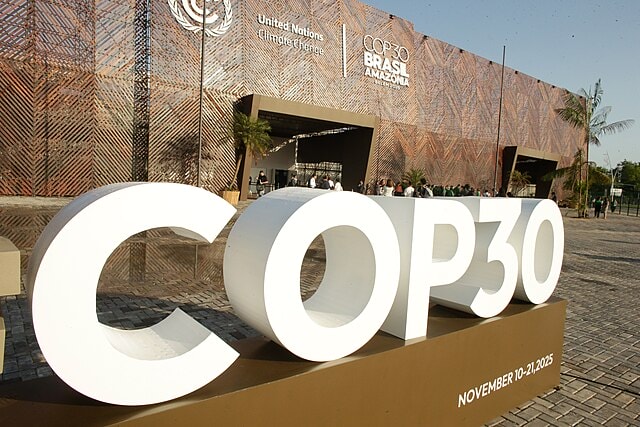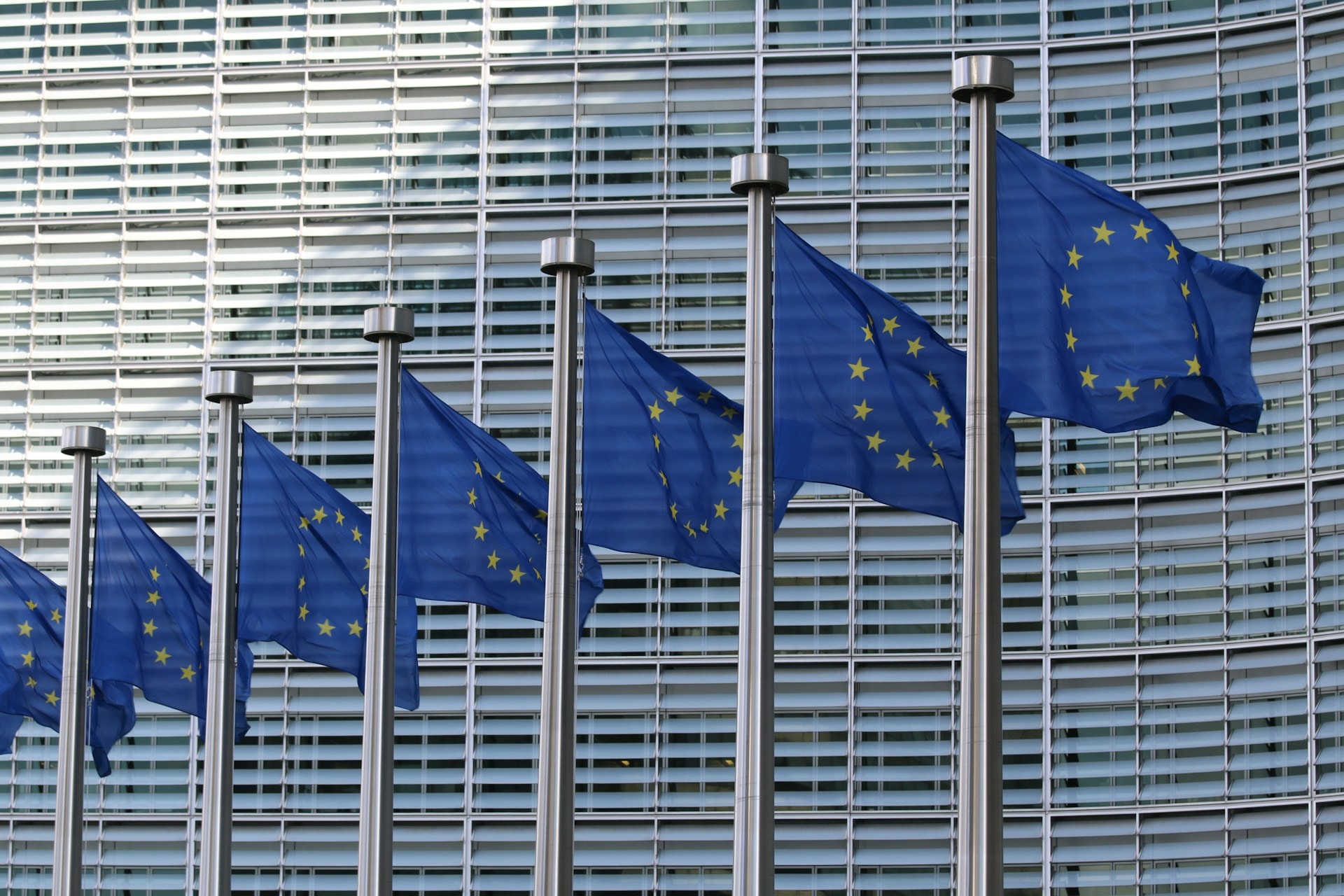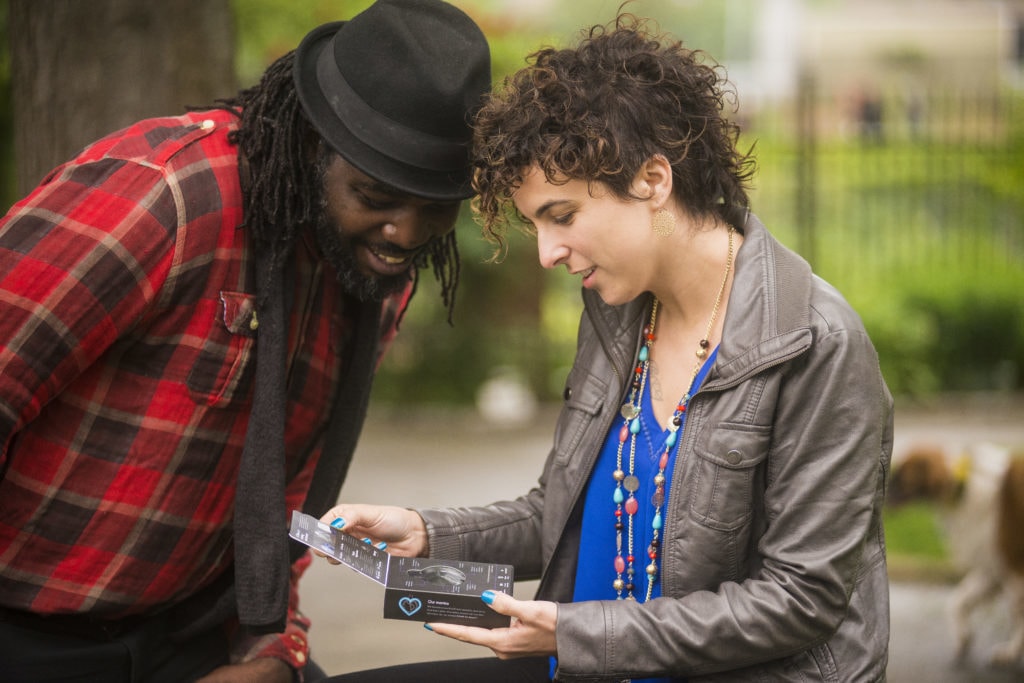Investing in Education is the key. The trend nowadays is to use the motto “Young people are the future”. This phrase has been abundantly used by politicians who influence globally the status quo, by teachers, journalists, you and me. Yet, what is the actual meaning of this phrase and how is it going to affect the future world?
Obviously, young people are the future but the quality of the future depends on the level of education not only of the future leaders but also of the future followers. While sustainable development becomes more and more popular among everyday life’s interactions and communications, people have to realize that it is not a method or a magic technique which will change the world; it is a philosophical and behavioral approach. A way of life.
EDUCATION IS THE KEY, USE IT WISELY TO OPEN THE FUTURE
The Sustainable Development Goal 4 (SDG4) is the key to bringing the change and making people aware of the planet’s and world’s need for real sustainable development. It sounds cliché but is true and Nelson Mandela, one of the most influential visionary leaders, once stated: “Education is the most powerful weapon which you can use in order to change the world.”
IN THE PHOTO: Students are getting challenged to go beyond their limits and are pushed to overcome obstacles, like in the real life. When working together, students understand the importance of collaboration and effective communication among the members. PHOTO CREDIT: Konstantinos Maragkos
How? Investing in the Youth is the most significant renewable resource. This is the statement of Titus K. Suter, Founder of the Kenyan Eagle Wings Mentorship Academy during a Training Seminar about studying opportunities in Europe at Kenyatta University in Nairobi in January 2018.
If you want to go far, you have to do it together with others and if you want to see people fishing, you have to teach them how to fish.
It is the knowledge that never ends, it is the education that increases the level of understanding, respecting but most importantly makes people share what they know.
By contributing to the accomplishment of this goal, poverty will be alleviated; hunger will end and food security and improved nutrition will be at the top of the agenda; health and well-being will be promoted for people of all ages; men and women will enjoy same rights while young girls and women will be empowered; the water and sanitation will have improved quality and will be accessible to everyone; the energy will be clearer and cheaper climate change will be mitigated; job opportunities will be distributed fairer and the economic growth will be sustained; infrastructure will be more resilient, industrialization will be inclusive and innovation will be fostered; inequality will be reduced and community development will be supported; all cities and human settlements will be safer; sustainable consumption and production patterns will be ensured; climate changed will be tackled; oceans, seas and marine resources will be conserved and sustainably used; terrestrial ecosystems and forests will be protected, restored and responsibly used, desertification will be combated, land degradation will be reversed and biodiversity loss will be halted; peaceful and inclusive societies will be promoted for sustainable development while justice will be accessible for all and effective, accountable and inclusive institutions at all levels will be built; global partnerships will be established aiming at the achievement of all the above-mentioned goals.
In other words, education is key to achieving all the SDGs in the long run.
USE ALL FORMS OF EDUCATION FOR A POSITIVE “DOMINO EFFECT”
Education has different forms and exists in different realities in our everyday life. There is not a single human being in this world that does not have interests and would not like to engage their life according to those interests and according to their passion.
The critical point is to start the process of identifying your interests. Every person discovers them in different environments, periods and phases but we all have them. We need people who will create systems that take out the best of every individual giving the space for personal growth and career development.
Another important point for youth is to understand and cultivate their strengths and talents. Education offers life-long learning opportunities if perceived also as a philosophical approach. Education does not just mean going to the university, obtaining a degree and getting a title before your name but it means empowering your personality, increasing and improving your skills, motivating and inspiring the others to do so.
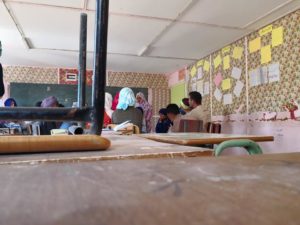
IN THE PHOTO: Students are given time to reflect on the previous activity and express their feelings and their thoughts. Simple things can make the difference in education, when you involve students in a friendly process, giving them space to show their potential.. PHOTO CREDIT: Konstantinos Maragkos
It is called a “domino effect” when people adopt the behaviour of their surroundings and are influenced –in a positive or negative way.
Imagine a positive domino effect by empowering actions which would lead to everyone discovering themselves and improving their communities. This can be applied to every different reality that we live in.
Take the case of Father Antonios Mutyampa from Uganda, a church missionary who had the chance to educate himself in Greece and then he decided to go back to Uganda and restructure several communities on the basis of quality education. He realised how his life has been transformed and how this is changing whole communities. He is the one who is daily teaching people how to fish, preparing their future for themselves.
A visionary leader is always a well-educated person in different levels, combining traditional education in school and University but also informal education, the one that only life and its experiences can make you grow.
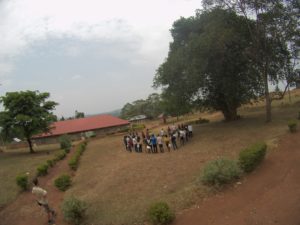
IN THE PHOTO: Outdoor education should be included in the educational curricula. Students find themselves in nature and their approach to learning becomes an entertaining process which increases their motivation to participate actively. PHOTO CREDIT: Konstantinos Maragkos
TAKE THE RESPONSIBILITY TO BRING THE CHANGE
It is our responsibility to take action towards challenges which affect the well-being of human beings and the qualitative level of our planet. Education has always been the key to transforming ideas into projects, projects into enterprises but most importantly, education has been able to transform mentalities.
Innovation, creativity, critical thinking, problem-solving, communication and interpersonal interactions are being developed through education. One of the reasons that hold a whole continent years back is the lack of proper education.
Africa’s bright minds try to transform the educational paradigm from a post-colonialism approach to a more Afro-centric approach, educating the youth on how to love and be proud of their continent and all the achievements that Africa has been able to do during history.
Slavery and colonialism happened in the past but are still influencing the status quo of Africa and are in the mind of the people. It is up to us to bring a holistic change and empower people through education, to change perceptions and mentalities.
It will take time but it will happen if you and I start pushing.
WHAT IS WRONG WITH AFRICA?
Please stop trying to save Africa, it does not need to be saved, at least from westerners who are not well-informed or educated enough to be useful members of African communities. Educate yourself and learn before going out to save the world.
Africa is rich in terms of resources, culture, gastronomy, hospitality and first and foremost people. Stop going to Africa to offer “help”, “support” and “aid”, it is not sustainable. It is against personal and community development.
Do not build schools because they do not teach the kids. People teach kids.
Find the way to transfer your knowledge and empower the teachers through education, in order for them to be able to empower their future students. How would you let someone develop when you treat them as beggars?
When you consciously or unconsciously donate tangible “gifts”, in order to put a smile on your face and more likes in your social media accounts? You are responsible for keeping children out of school, even if you feel sad when you see pictures of thin children starving or when you see children carrying water on their heads. Do not save the world in this way. Do not go to see orphan children or buy products from them in the streets. You do not help them but you keep them there.
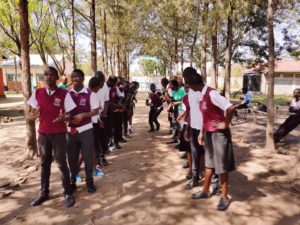
IN THE PHOTO: The students enjoy outdoor non-formal education, since it creates an open space and friendly environment for self-development and entertainment through the method learning by doing. PHOTO CREDIT: Konstantinos Maragkos
Good intention is not enough to bring change. A conscious effort is enough, a continuous communication with education stakeholders of the community that you want to visit is useful.
Learn and research before you visit a place where you want to volunteer and understand that you go to learn, not to help. Work together with local partners and stakeholders that are facing the challenges of their communities every day, share your knowledge, create an innovative and joint project, together.
TECHNOLOGY AND INNOVATION
First of all, due to the fast development of technology, almost all the people all around the world will have access to smartphones. What does this mean and how is it connected with education?
Interacting with NGOs in the field of education during the project WE AfriHug in Eastern Africa and observing the daily activities of people we reached the following conclusion: “We live in an ever-changing society, where the needs but also the habits change continuously. Nothing remains the same. The new generations are growing up getting used to interacting with technology. It is something that triggers the interest and makes you search further. Children will stop reading books but will prefer to stay with a smartphone. Put education into what triggers a child’s interest and you will see that the knowledge will be absorbed from them like they are sponges.”
An innovative teacher in Ghana is teaching digital literacy skills to the students without the means of technology. He is simply drawing on the blackboard. This teacher understood how the future will be and wants to educate the students in the right direction.
In Kenya, all the monetary transactions are occurring via technology. M-Pesa (Mobile Pesa-money in Swahili) gives the opportunity to Kenyans to transfer money without the use of cash or credit card. This system is changing Africa’s banking since 2007, while in Europe or USA this is something new.
It is part of the daily life to use technology, in order to make your life easier. The future of education lies in innovation through technology.
MULTI-STAKEHOLDER PARTNERSHIPS AND INVESTMENTS
Education is a must, quality education is a right. How can we achieve results? How can we bring all children to schools and how can we transform the educational system in a way that does not produce only the same pattern of citizens? Education must be empowerful.
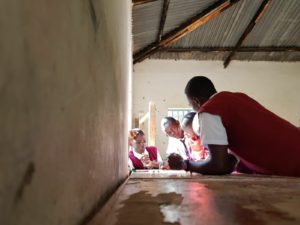
IN THE PHOTO: Discussing and sharing ideas, students come up with innovative projects. Working in teams is significant for the 21st century, since teamwork is one of the most precious soft skills. PHOTO CREDIT: Konstantinos Maragkos
Imagine what would happen with all the wasted money from humanitarian and helping projects? What about development projects through education instead of one-week travel to distribute new pens and take photos for Facebook?
Communities will be empowered only if the members of the community will be educated and empowered. What are you doing for this and which actions are you taking? How is it possible for a community/country/continent to experience a tremendous paradigm change and see results in the long term? Not by praying but by acting.
The actions which need to be undertaken lie in two dimensions: public and private. Governments, ministries and schools have to take the responsibility, create new agendas, change the curricula, introduce innovation and technology and bring the change in the long run. At the same time, private stakeholders, such as NGOs are the ones that are struggling the last years to have an impact and improve the quality of life of people through education. Implementing different curricula of activities, non-formal education, for instance, they have an impact but to a smaller extent in comparison with the public stakeholders, ministries of education for instance.
Imagine now the dynamic combination and joint forces of public and private stakeholders in terms of knowledge, innovation, impact and investment. Investment is the key, investing in education means enhancing people’s life, alleviating poverty, fighting for gender equality an achieving all the SDGs in the long term. Never stop fighting for education even as a conscious activist and push it to create partnerships and involve key-actors who can influence and bring a change, the change that you want to see in the world.
Activism can turn in politics, as in the case of Brut in Kenya , a.k.a Wangari Maathai, who gained the trust of Kenyans as an activist, going against the government by taking actions for the preservation of the environment. She founded the highly successful Green Belt Movement that improved the well-being of Kenyans and spread across Africa. In 2002 she was elected in the parliament with 98 percent of the vote and the next year became deputy minister for the environment and some years later she was the first African woman who won the Nobel Peace Prize.
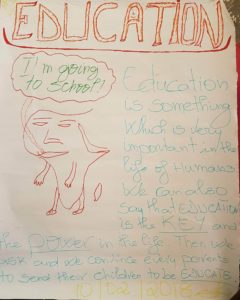
FEATURED PHOTO: During the activity “Front page”, the students are creating the front page of a newspaper trying to convince their classmates about the authenticity of the news. A group of students from “Lycée d’Enseignement Technique et Professionnel de Lomé” wrote: “Education is something which is very important in the life of Humans. We can also say that education is the key and the power in the life. Then we ask and we convince every parents to send their children to be educated”.. PHOTO CREDIT: Konstantinos Maragkos
Private and public stakeholders should work together bringing politics at a level that benefits the citizens. Never stop trying to bring the right people together and take initiatives, even small, to express innovative ideas and to serving the world and every community. Everyone deserves a good quality of life and this can be guaranteed for the next generations only through the most empowerful tool, education.


